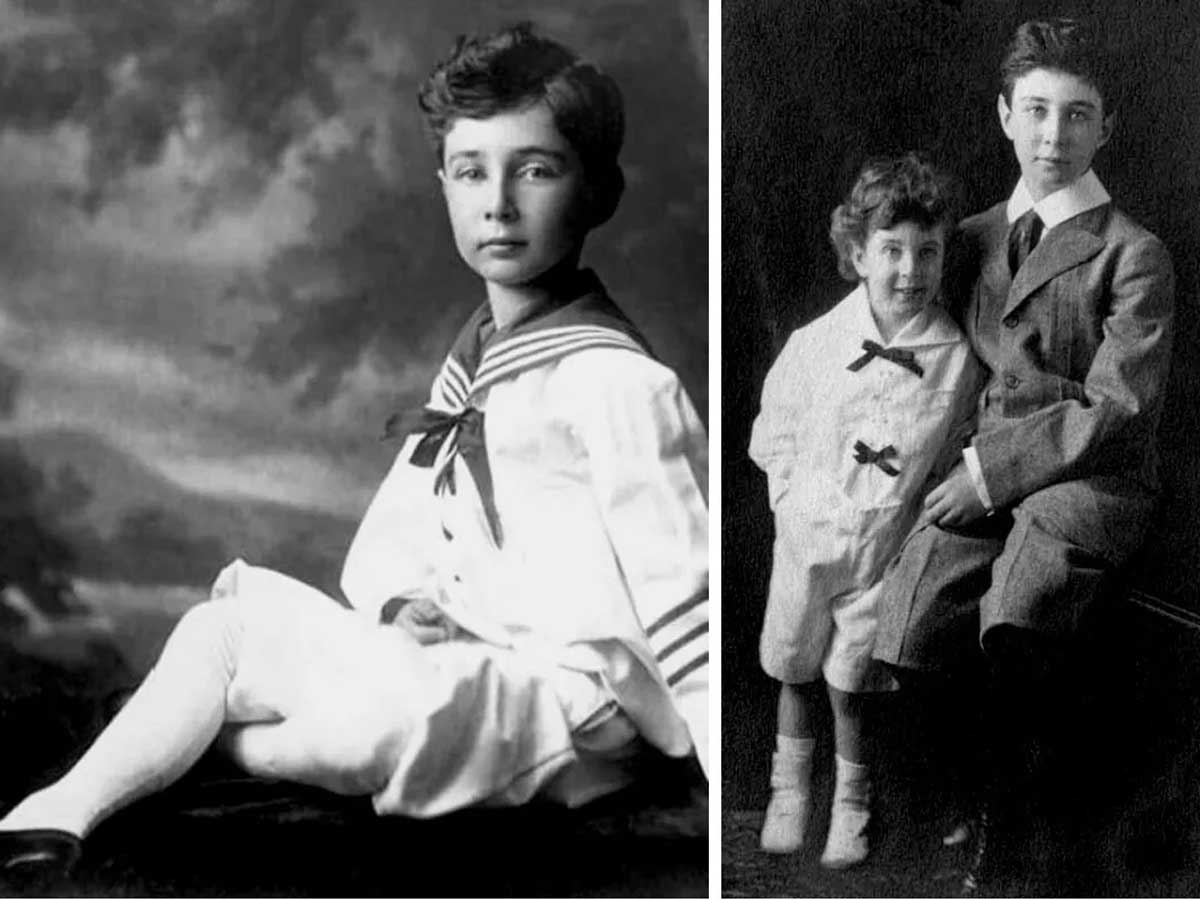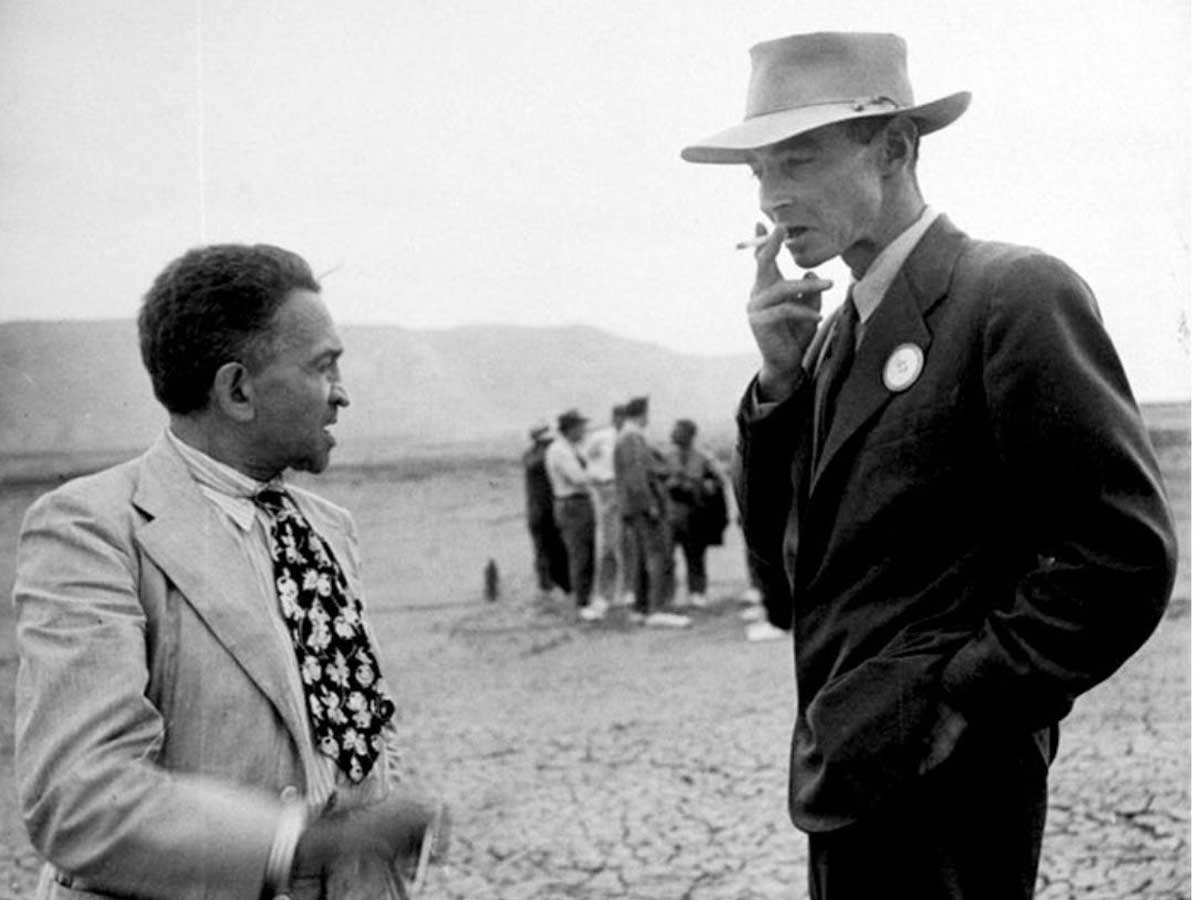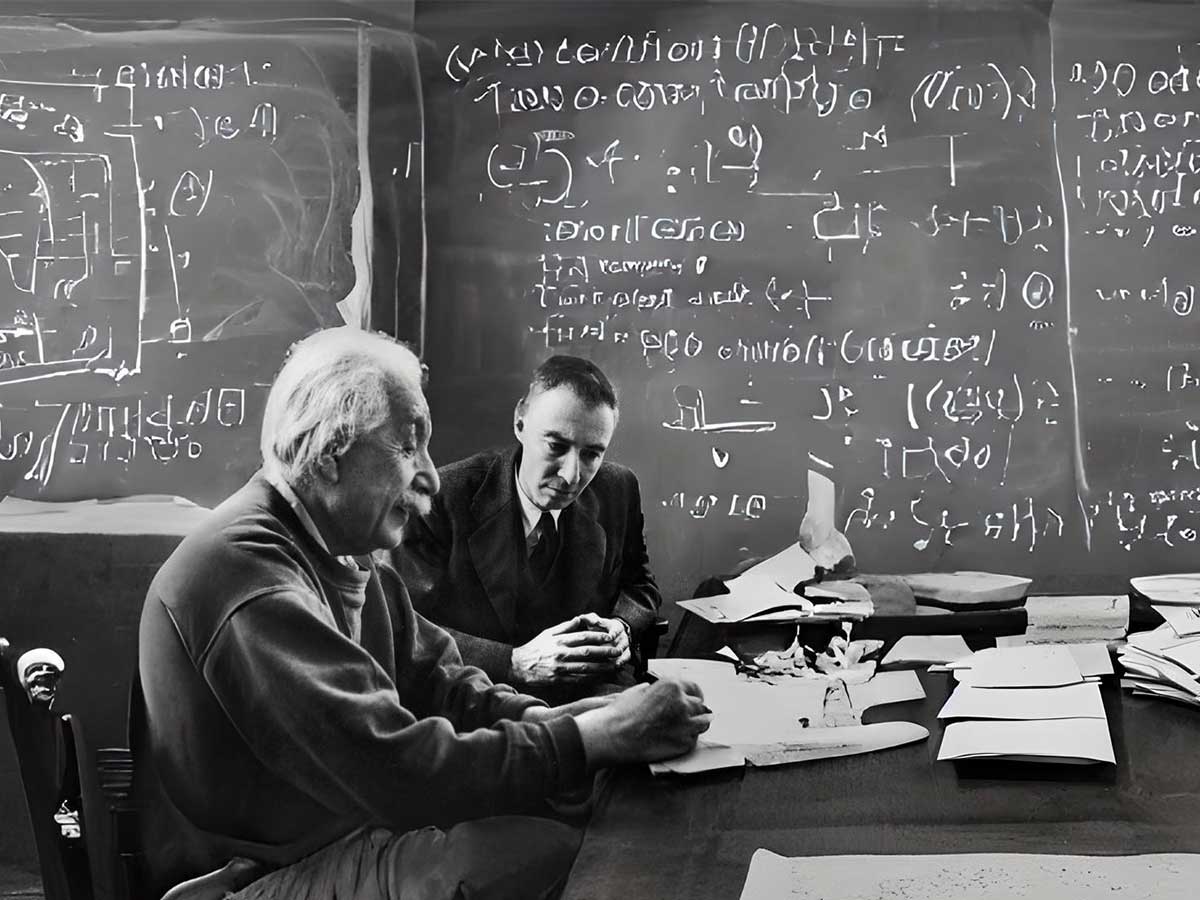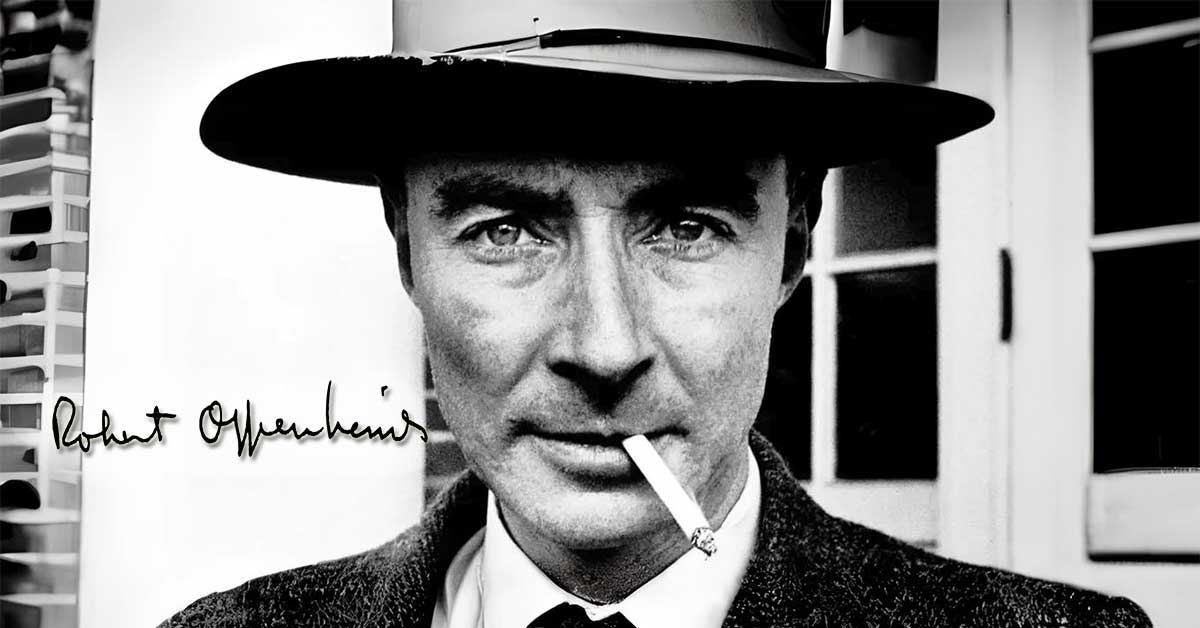Picture this: It's 1904, and little Julius Robert Oppenheimer is born into a well-off German family in New York City. Right from the get-go, he's got that spark of brilliance in his eyes. J. Robert Oppenheimer was born to a fascinating family on April 22, 1904, in New York City.
His parents, Julius S. Oppenheimer and Ella Friedman, came from Jewish heritage but didn't practice religious traditions. Instead, they were connected to the Ethical Culture Society, a progressive group led by Dr. Felix Adler, which focused on social justice, civic responsibility, and secular humanism.
How did this fascinating boy go from shaping the atomic age to defending his honor in a courtroom? It's a long but amazing story. Let's start from the beginning.

Early Life and Education
When Oppenheimer attended Harvard University, he had an insatiable thirst for knowledge. He dived into a wide range of subjects, excelling in Latin, Greek, physics, chemistry, and even indulging in poetry and the study of Eastern philosophy.
In 1925, he graduated and embarked on research at the renowned Cavendish Laboratory in England, where he worked under the guidance of Lord Ernest Rutherford, a leading figure in atomic structure studies.
During his time at Cavendish, Oppenheimer collaborated extensively with British scientists and contributed to the progress of atomic research. At just 22 years old, he continued his studies at the University of Göttingen in Germany, mentored by the influential Max Born.

There, he interacted with luminaries such as Niels Bohr and P.A.M. Dirac. In 1927, Oppenheimer received his doctorate and engaged in significant work alongside Born on molecular structure, resulting in the formulation of the groundbreaking Born-Oppenheimer Approximation.
Oppenheimer's passion for physics took him to renowned centers of scientific exploration, including Harvard, the California Institute of Technology, Leyden, and Zurich. In 1929, he received offers to teach at both Caltech and the University of California at Berkeley.
He accepted both positions, which led to a unique "commuting" arrangement between Pasadena and Berkeley, a setup that many of his colleagues and students mirrored.
Throughout his early career, Oppenheimer focused his research on understanding the energy processes of subatomic particles, delving into the exploration of electrons, positrons, and cosmic rays. He also made notable contributions to the study of neutron stars and black holes.

The 1920s marked a significant era in scientific development, with the emergence of quantum and relativity theories that revealed the equivalence of mass and energy and the dual nature of matter.
Oppenheimer's university positions allowed him to deeply explore and contribute to the advancement of quantum theory, influencing and inspiring generations of American physicists with his remarkable leadership and intellectual independence.
Oppenheimer and the Manhattan Project
General Leslie Groves was granted the top-secret task of leading the Manhattan Project, an ambitious endeavor intended to develop the atomic bomb. On his very first day as project director, Groves quickly acquired 1,200 tons of essential uranium ore before quickly securing an Oak Ridge site where they'd refine it further.

Then, about one month later, he made another remarkable move by personally choosing Oppenheimer as the science director at soon to be established Los Alamos National Laboratory.
Oppenheimer played an essential part in The Manhattan Project, taking on the essential task of isolating uranium-235 from natural uranium and determining its exact mass for use as the core material in nuclear bombs.
The Manhattan Project launched on August 1942 under U.S. Army guidance and led by British and American physicists alike working towards harnessing nuclear energy for military use, in 1943, Oppenheimer selected Los Alamos near Santa Fe, New Mexico, to set up and lead this highly classified laboratory project.

Los Alamos scientists worked diligently, leading up to an incredible momentous milestone, the Trinity Site detonation on July 16, 1945, in New Mexico that marked the dawn of the nuclear age. Oppenheimer was profoundly moved by witnessing the Trinity test, famously quoting Bhagavad Gita's quote about becoming “Now, I am become Death, the destroyer of worlds."

After this groundbreaking event, he left Los Alamos Laboratory as its Director in October 1945 before heading Princeton's Institute for Advanced Study and later chairing Atomic Energy Commission General Advisory Committee from 1947 to 1952 (when this committee opposed its development by 7 votes against 5).
Oppenheimer’s Security Clearance Got Canceled
On December 21, 1953, Oppenheimer received some startling news: A military security report accused him of associating with communists, hindering Soviet agent identification efforts, and opposing the construction of the hydrogen bomb.
Although an administrative hearing later exonerated him of such charges of treasonous activities, their allegations restricted his military access & clearance, eventually leading to his termination from U.S. Atomic Energy Commission consulting contracts as an advisor.

Oppenheimer found conspicuous support among his fellow scientists from the Federation of American Scientists, who rallied around his defense as being unfairly targeted in an unwarranted witch hunt. Later in life, Oppenheimer explored both science and societal interactions as well as moral challenges raised by new technological innovations.
Oppenheimer served on the Atomic Energy Commission from 1947-1952 as chairman of its General Advisory Committee and vigorously opposed hydrogen bomb development due to their immense destructive potential compared to that of an atomic bomb, sparking great debate at that time.
Oppenheimer’s legacy

Oppenheimer left an indelible mark on society. He opposed the development of the hydrogen bomb for fear it would worsen nuclear arms competition, prompting a contentious security clearance trial. While his student Willis Lamb became a Nobel laureate, Oppenheimer was nominated three times but never won.
President Lyndon B. Johnson honored Oppenheimer with the Enrico Fermi Award of the Atomic Energy Commission in 1963. After leaving IAS in 1966, he succumbed to throat cancer and died shortly afterward on February 18, 1967.
In 2014 the U.S. Department of Energy declassified his hearing transcript, revealing how unfairly he was treated during the McCarthyism period he had been.

Oppenheimer held the position of Director at Princeton's Institute for Advanced Study from 1934 until 1953, leading studies on quantum and relativistic physics as well as working to disseminate scientific discoveries to the general public through Reith Lectures given on BBC under the banner of "Science and the Common Understanding."
President Kennedy hosted an elegant White House dinner to make amends for Oppenheimer's treatment during McCarthyism, and President Johnson later presented him with the Fermi Award as recognition of his contributions.
Oppenheimer has inspired numerous works, from plays and opera (John Adams' "Doctor Atomic"), as well as books by Glenn Scherer & Marty Fletcher to Cynthia C Kelly, who have all written extensively about him. His legacy continues to fascinate and intrigue us even today! His life as both scientist and complex figure still delights and fascinates the public today.

J. Robert Oppenheimer was a trailblazing and complex figure in science. His leadership of the top-secret Manhattan Project and role as "father of the atomic bomb" during World War II were pivotal.
His later contributions to theoretical physics and advocacy for arms control were equally impactful. Despite adversities like the controversial security hearing that revoked his clearance, Oppenheimer remained dedicated to pursuing science responsibly.
In the 1930s, even the eminent Albert Einstein doubted the possibility of harnessing nuclear energy. But Oppenheimer's perseverance and brilliance led to groundbreaking innovations in nuclear physics. His enduring legacy continues inspiring scientists globally.
Beyond his scientific acclaim, Oppenheimer's insights on the interplay of science and society underline the ethical considerations accompanying discovery.
Oppenheimer's transformation from ingenious physicist to "father of the atomic bomb" and, later, champion of arms control and peace epitomizes the intricacies of human nature when encountering complex choices. His compelling life exemplifies the immense influence science wields and the obligation to apply knowledge to benefit humanity ethically.
Oppenheimer remains a powerful emblem of both the wonders and perils of the atomic age he helped usher in.
Sources: atomicarchive.com / nuclearmuseum.org / britannica.com
